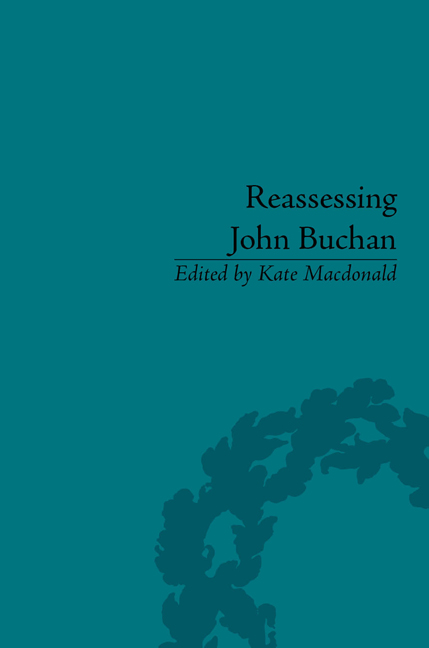Book contents
- Frontmatter
- CONTENTS
- List of contributors
- Introduction
- I Cultural Roots
- II Divided Loyalties
- III Literary Art
- 12 ‘A Fraud Called John Buchan’: Buchan, Joseph Conrad and Literary Theft
- 13 Aphrodite rejected: Archetypal Women in Buchan's Fiction
- 14 John Buchan: Politics, Language and Suspense
- 15 Buchan's Supernatural Fiction
- 16 The Anarchist's Garden: Politics and Ecology in John Buchan's Wastelands
- 17 Tracing The Thirty-Nine Steps
- Notes
- Works Cited
- Index
14 - John Buchan: Politics, Language and Suspense
from III - Literary Art
- Frontmatter
- CONTENTS
- List of contributors
- Introduction
- I Cultural Roots
- II Divided Loyalties
- III Literary Art
- 12 ‘A Fraud Called John Buchan’: Buchan, Joseph Conrad and Literary Theft
- 13 Aphrodite rejected: Archetypal Women in Buchan's Fiction
- 14 John Buchan: Politics, Language and Suspense
- 15 Buchan's Supernatural Fiction
- 16 The Anarchist's Garden: Politics and Ecology in John Buchan's Wastelands
- 17 Tracing The Thirty-Nine Steps
- Notes
- Works Cited
- Index
Summary
John Buchan's fiction is continuingly popular arguably because of a quality of suspense in his writing; its power to grip and hold the reader's attention. This is perhaps not exceptional: genre fiction flourishes on the basis of the fulfilment of the promise of delivery of particular expectations. In thrillers, crime fiction, ‘police procedural’ stories, murder mysteries, novels of espionage and ‘international intrigue’, suspense is a common factor. Whether the narrative involves events unknown to the narrator that must be discovered and pieced together to solve a conspiracy puzzle, or whether a strictly linear narrative brings characters together who are supremely villainous in situations that are life-threatening, the formulae are familiar enough. But Buchan is different.
Almost by definition, commercially successful genre fiction must balance the fulfilment of a prediction (genre expectation) and the maintenance of novelty. The unusual (novelty) cannot be allowed to jeopardize the satisfaction of fulfilment, but the delivery of fulfilment must not lapse into complacency. In Buchan's writing something very different is at stake. Buchan made money from his writing but the commercial imperative was not his major motive. Therefore he did not have to subscribe to the rules of genre. He wrote what he called his ‘shockers’ for pleasure, because he enjoyed reading this kind of fiction and he thought he could write as well as the authors he was reading.
Buchan's success could hardly have been predicted. One hundred years after they were written, his thrillers are still reprinted, widely available and read with general appetite. Arthur Conan Doyle's Sherlock Holmes stories, aided by a much more extensive representation through film, television and radio, have an international, immense popularity, but they evoke a particular nostalgia, a world that is significantly late Victorian or Edwardian, very firmly set before the First World War. In later stories, though, Holmes is not the same. His era ended with the First World War, and his afterlife as a retired beekeeper on the Sussex downs, withdrawn from London, seems apt.
- Type
- Chapter
- Information
- Reassessing John BuchanBeyond the Thirty Nine Steps, pp. 171 - 182Publisher: Pickering & ChattoFirst published in: 2014

